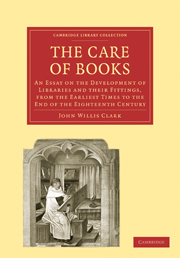 The Care of Books
The Care of Books I have now traced the evolution of the bookcase from a clumsy contrivance consisting of two boards set at an angle to each other, to the stately pieces of furniture which, with but little alteration, are still in use; and I hope that I have succeeded in shewing that the fifteenth century was emphatically the library-era throughout Europe. Monasteries, cathedrals, universities, and secular institutions in general vied with each other in erecting libraries, in stocking them with books, and in framing liberal regulations for making them useful to the public.
To this development of study in all directions the sixteenth century offers a sad and startling contrast. In France the Huguenot movement took the form of a bitter hostility to the clergy–which, after the fashion of that day, exhibited itself in a very general destruction of churches, monasteries, and their contents; while England witnessed the suppression of the Monastic Orders, and the annihilation, so far as was practicable, of all that belonged to them. I have shewn that monastic libraries were the public libraries of the Middle Ages; more than this, the larger houses were centres of culture and education, maintaining schools for children, and sending older students to the Universities. In three years, between 1536 and 1539, the whole system was swept away, as thoroughly as though it had never existed.
To save this book to your Kindle, first ensure [email protected] is added to your Approved Personal Document E-mail List under your Personal Document Settings on the Manage Your Content and Devices page of your Amazon account. Then enter the ‘name’ part of your Kindle email address below. Find out more about saving to your Kindle.
Note you can select to save to either the @free.kindle.com or @kindle.com variations. ‘@free.kindle.com’ emails are free but can only be saved to your device when it is connected to wi-fi. ‘@kindle.com’ emails can be delivered even when you are not connected to wi-fi, but note that service fees apply.
Find out more about the Kindle Personal Document Service.
To save content items to your account, please confirm that you agree to abide by our usage policies. If this is the first time you use this feature, you will be asked to authorise Cambridge Core to connect with your account. Find out more about saving content to Dropbox.
To save content items to your account, please confirm that you agree to abide by our usage policies. If this is the first time you use this feature, you will be asked to authorise Cambridge Core to connect with your account. Find out more about saving content to Google Drive.